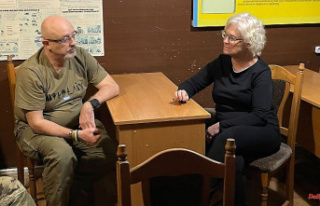It is true that this year there was an above-average grain harvest in the north-east. But the energy price crisis is clouding farmers' mood. Prime Minister Schwesig also referred to it in Ferdinandshof.
Ferdinandshof (dpa/mv) - With a parade and a folk festival, the 31st state harvest festival was celebrated in Ferdinandshof (Vorpommern-Greifswald district) on Sunday. Agriculture with around 4,700 farms is modern, efficient and at the same time sustainable, said Mecklenburg-Western Pomerania's Prime Minister Manuela Schwesig (SPD). "Nowhere else in Germany is such a high proportion of land farmed organically."
The northeast is a traditional agricultural country, said Schwesig. "To this day, agriculture and the food industry are one of the most important sectors of our economy." The 2022 harvest was satisfactory overall, albeit with regional differences.
"But the current situation for agriculture in our country is not easy," said Schwesig. Hardly any other area is already feeling the effects of climate change. In addition, the war in Ukraine led to higher costs for fertilizer and energy.
In the morning there was also a thanksgiving service in the Scharmutzelkirche in Ferdinandshof. "Thanksgiving means: The decisive thing in my life is not the work of my own hands," said Bishop Tilman Jeremias.
State farmer president Detlef Kurreck said, "the effects of the Ukraine war have put many farms in economic distress". The industry is all the more grateful for the good harvest this year.
The farmers in Mecklenburg-Western Pomerania have reason to celebrate given the above-average grain harvest this year. But the joy is clouded by inflation and galloping energy prices. In addition, there are government restrictions on the use of fertilizers and pesticides, which, from the farmers' point of view, lead to reduced yields. With the guidelines from Brussels, the loss of species should be stopped and the pollution of the water bodies should be curbed.
Agriculture Minister Till Backhaus (SPD) emphasized that a good 50,000 families make their living from the industry in Mecklenburg-Western Pomerania. Backhaus called for a more conscious approach to food. People in Germany would throw away 78 kilograms of food per inhabitant. That corresponds to almost a third of the production of German agriculture. "We'll just throw them away. That can't be right." Germany lives at the expense of other regions.












